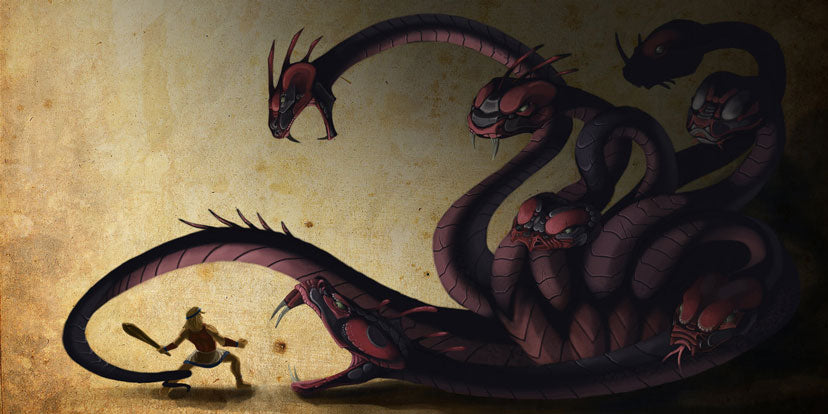
The etymology of the word dragon
The dragon is a majestic and fantastic animal, which has been used in various forms in the four corners of the world since the dawn of time.
But where can the etymological origin of the word "Dragon" come from? We will discover this fabulous story today. Come on, let's go!

1. Greek and Latin origin
A. Latin Etymology
According to the Oxford English Dictionary, the word "dragon" comes from the Old French, itself descended from the Latin word "Draco" or "draconem" (huge snake). The Romans perceived dragons as snakes with wings.
If you are into things that are not only beautiful, but also carry some historical significance, don't miss our selection of viking jewelry:
It is important to note that the term "Draco" was used to describe any large snake, be it real, mythological or both.
Thus, the first dragons of Western mythology were legless snakes. The latter creatures did not appear until the Middle Ages.

B. Greek Etymology
"Draconem" itself comes from the Greek word "Drakon" (serpent, giant met fish). The root "Derk" (to see), indicates that the literal meaning of "Drakon" was "one who has the deadly gaze". This word can also be related to other terms, such as "sharp", "look", "visible" or "see clearly".
In reality, Greek dragons, like the Latin ones, were mostly presented under the appearance of a snake. To illustrate this, we can take the famous pythons and boas. We also remember the hydra of Lerna, fought by Hercules.
The Greek and Latin mythologies being closely linked, it is complicated to differentiate the Greek dragon from the Roman.

Hercules fighting the Hydra
2. In the Nordic myths
Apart from its Greco-Latin origin, the etymology of the word Dragon also has Nordic roots.
Indeed, in Norse, the word "Ormr" means "Dragon". To be quite accurate, literally speaking, it means "worm" or "vurm". But it is translated as "dragon" because it is associated with dragon-like and snake-like creatures.
The reason why this word does not exactly mean "dragon", remains in the Norse myths. Indeed, Jormungandr, a very famous dragon of Scandinavian mythology, was in fact a giant snake.
We can also mention Nidhogg, one of the few creatures in the Norse stories to be represented expressly as a dragon, but who was also described as a snake.

Jormungandr
3. In the British Isles
In ancient Irish mythology, "Drag" meant fire. This is intriguing and interesting, as many of the dragons of Ireland were more related to the water world. One example is Muirdris, a huge water serpent.
According to Welsh mythology, "Ddraig" means Dragon. This refers in particular to the famous Red Dragon of Wales. The most famous being the Y Ddraig Goch, found on the flag of Wales.
Still in Welsh, "Dreigiaw" translates as "silent meteors". This can be seen as a sign that the Dragons had a destructive power. But, if the Y Ddraig Goch was selected to be the emblem of the Welsh flag, it is mainly because it is a symbol of authority.
Did you know that the name "Erwan" comes from the Celtic word "aerouant", which means dragon?

Welsh dragon
4. In England
The word Dragon arrived in England in the 13th century via the Old French language.
5. In Asia
Dragon is said "Lóng" in Mandarin Chinese, and "Lùhng" in Cantonese. According to some historians, this word is an onomatopoeia of the sound of thunder.
In Chinese mythology, there are several dragons. They have in common the word long:
- Tianlong: celestial dragon
- ShengLong: spiritual dragon
- Silong: earthly dragon
- Fu-Zang Long: guardian of treasures
- LongWang: dragon king
If you want to know more, we invite you to discover our article on Chinese dragons.

Chinese dragon
6. Indo-European roots
To find the ancestral roots of the word dragon, we can go back to the various ancient Indo-European languages.
It is therefore possible that the most distant ancestor of this word was part of the original Indo-European language. The latter would have been that of the descendants of Japheth, just after the flood and the dispersion of Babel.
Finally, you can take a tour of our jewelry, inspired by the Nordic mythology:








